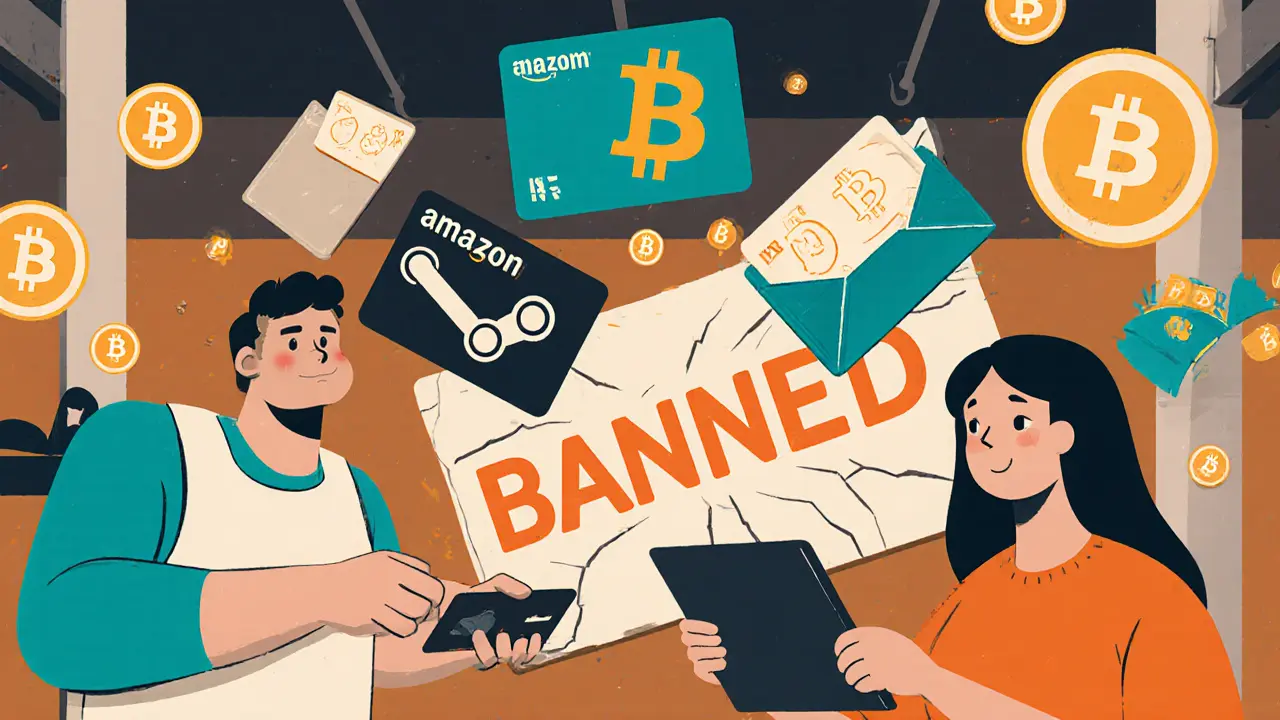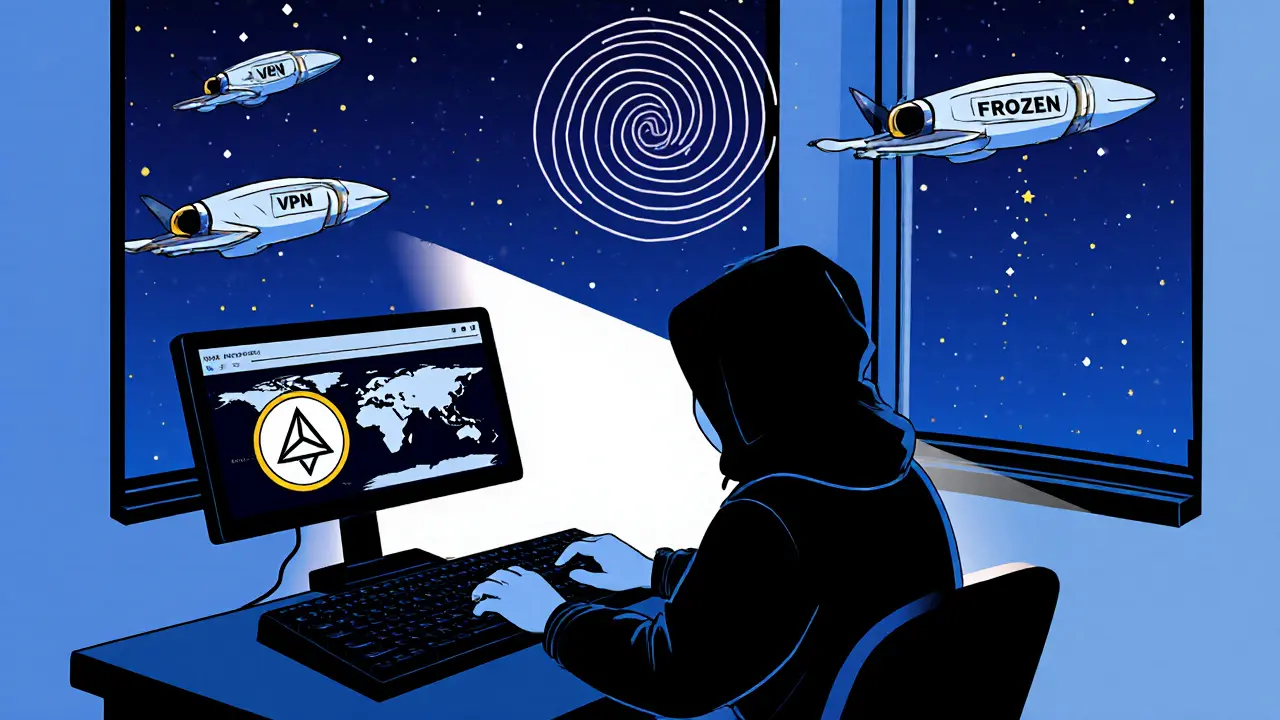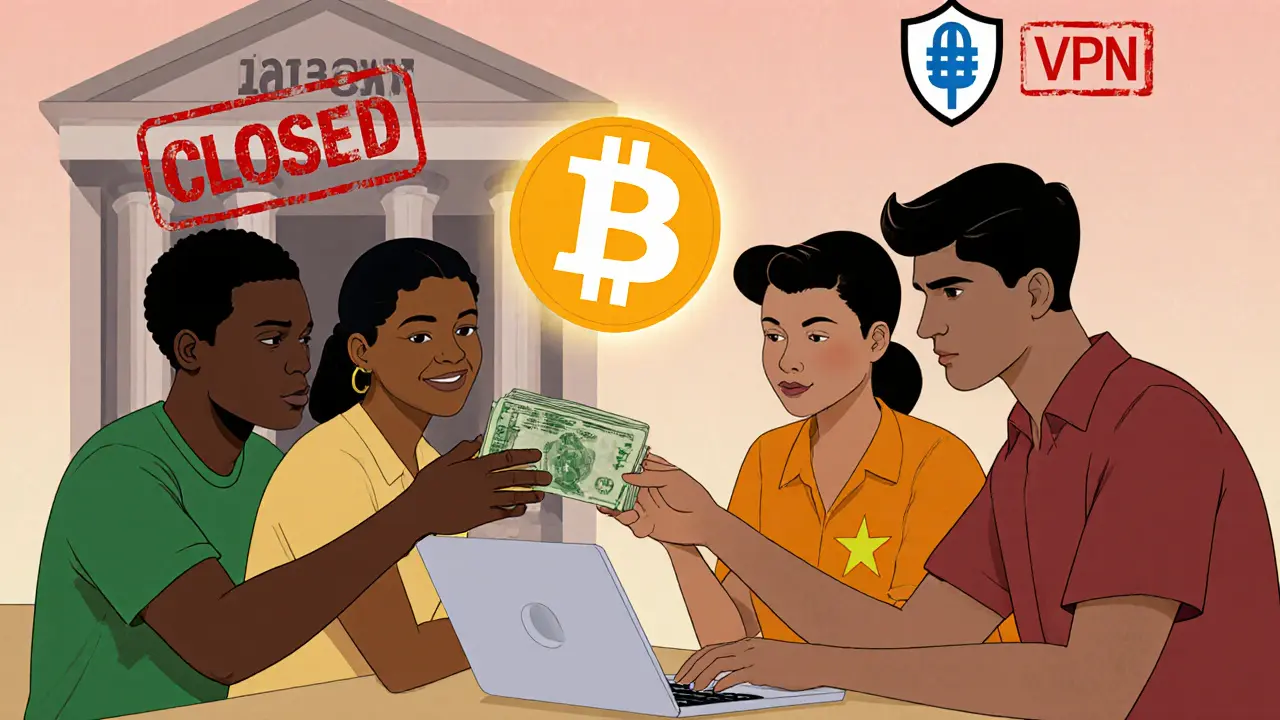When your bank won’t let you send money abroad, when wire transfers get blocked, when the government says crypto is illegal - what do you do? For millions of people in countries like Nigeria, Vietnam, Bangladesh, and Iran, the answer isn’t waiting for permission. It’s building a backdoor. And that backdoor? It’s cryptocurrency.
Why banks won’t help - and what that forces people to do
In places like Nigeria, the Central Bank banned crypto transactions in 2021. Banks were ordered to shut down accounts linked to exchanges. In Vietnam, trading crypto can get you fined over $8,000. In Bangladesh, it’s considered a criminal offense under money laundering laws. China doesn’t just ban exchanges - it shuts down mining rigs and freezes wallets. Turkey, Algeria, and Bolivia have similar crackdowns. But here’s the twist: people still trade crypto. Not because they’re tech wizards, but because they have no other choice. Inflation is eating their savings. Salaries are stuck in a collapsing currency. Remittances from family abroad? Impossible through normal channels. Crypto isn’t a luxury here - it’s survival.The tools they actually use - not the ones you hear about
Forget headlines about Bitcoin being “banned.” The real story is in the workarounds. Most people don’t use centralized exchanges like Coinbase or Binance directly. They use what’s called peer-to-peer (P2P) trading. Platforms like Paxful and LocalBitcoins let users trade crypto directly with each other. A Nigerian user might buy Bitcoin by sending money to a middleman’s local bank account. That middleman then sends Bitcoin to their wallet. No bank knows what the money was really for. Chainalysis says P2P makes up nearly 40% of all crypto volume in restricted countries. Then there’s gift card arbitrage. People buy $500 Amazon or Steam gift cards with naira, pesos, or taka. They list them on Paxful. Someone in the U.S. or Europe buys them with Bitcoin. The buyer gets the gift card. The seller gets crypto. In 2024, over $427 million in crypto was moved this way from restricted countries.How they hide their location - and why it’s not foolproof
Most exchanges block access from countries with bans. So users turn to VPNs. NordVPN says users from Nigeria jumped 342% between late 2023 and late 2024. From China? Up 217%. Tor browser use spiked in Iran and North Korea by over 200%. But it’s risky. In some countries, using a VPN is illegal. Internet shutdowns during protests or elections can cut off access for days. A 2025 survey found 47% of users in restricted countries lost access to exchanges during government-imposed internet blackouts. And even with a VPN, many exchanges still detect your real location through your phone number, IP address patterns, or device fingerprints. A Chinese user on Paxful reported their account froze after using a Chinese mobile number - even with a VPN.
No-KYC exchanges: privacy, but with big trade-offs
Some exchanges don’t ask for ID. These are called no-KYC platforms. Examples: Bisq, Hodl Hodl, Uniswap, PancakeSwap. You don’t need a passport. You don’t need a selfie. You just need a wallet and crypto. But here’s the catch: liquidity. Bisq trades an average of $1.2 million a day. Coinbase? $14.7 billion. If you want to sell $10,000 worth of Bitcoin on Bisq, you might wait days to find a buyer. On Binance P2P? Minutes. No-KYC also means no customer support. If you send crypto to the wrong address? Gone forever. If you get scammed? No one to call. A 2025 study found 67% of users in restricted countries had at least one security incident - 12% lost serious money to fake trading platforms.Privacy coins and the silent rise of Monero
Regular Bitcoin and Ethereum transactions are public. Anyone can see who sent what to whom. That’s a problem if the government is watching. Enter Monero (XMR) and Zcash (ZEC). These are privacy coins. They hide sender, receiver, and amount. Adoption in China jumped 317% since 2023. In Iran, up 289%. They’re not popular overall - just 2.3% of the total crypto market - but for people under surveillance, they’re essential. The downside? Fewer places accept them. Exchanges that do often have stricter withdrawal limits. And if you’re caught using them in a country where crypto is banned? You’re already on the radar.
The hidden cost: time, trust, and trauma
Setting up access isn’t a quick download. A step-by-step guide for Iranian users showed it takes 3 to 5 weeks just to get started. You need to learn how to store a seed phrase without writing it down on paper. You need to understand blockchain addresses. You need to trust strangers on Telegram who say they’ll send you Bitcoin after you pay in cash. World Bank data says 78% of new users in restricted countries need help managing their wallet keys. Lose the phrase? Lose everything. And the emotional toll? Real. A Facebook group for Bangladeshi crypto users recorded 87 account closures in January 2025 - $412,000 in frozen funds. One user wrote: “I saved for two years to buy Bitcoin. Now my account is gone. No explanation. No refund.”Who’s making money off this?
It’s not just users. Companies are betting big on these markets. Binance P2P processed $8.7 billion from restricted countries in early 2025. UAE-based exchanges like OKX and MGX are expanding services specifically for users in Nigeria, Vietnam, and Iran - even as they claim to comply with sanctions. U.S.-based platforms like Chipper Cash are helping Nigerians send money to crypto exchanges using virtual dollar cards. It’s a loophole - and it’s growing fast. But regulators are catching up. In February 2025, the U.S. FinCEN proposed rules that would require all exchanges serving American users to verify transactions over $300. That could break the chain - because many restricted-country users rely on U.S.-linked services to move money.What’s next? A cat-and-mouse game with no end
Governments are getting better at tracking crypto. Blockchain analytics firms now map wallet clusters and flag suspicious behavior. India’s new 30% tax on crypto gains pushed users to use Singapore-based intermediaries. China’s crackdowns forced traders to use decentralized exchanges like Uniswap - and now Uniswap’s traffic from restricted countries is up 187% since January 2025. Experts warn this isn’t sustainable. The IMF says 41% of Nigerian users were pressured into using platforms that later collapsed - losing $217 million in 2024 alone. But for people with no banking options, there’s no perfect solution. Only better ones. The future? Privacy tech like zero-knowledge proofs could make transactions truly untraceable. Gartner predicts a 340% jump in these tools by 2026. For now, the system works - barely. People are using gift cards, VPNs, P2P traders, and privacy coins to keep their money alive. They’re not breaking the law because they want to. They’re doing it because the system left them no other choice.Can you really use crypto if your country bans it?
Yes - but it’s not easy. Many people in banned countries use peer-to-peer (P2P) platforms like Paxful or Binance P2P to trade crypto without going through banks. They often use VPNs to hide their location and gift cards to convert local money into crypto. While it’s technically against the law in places like Nigeria or Bangladesh, enforcement is patchy, and millions still do it daily.
What’s the safest way to buy crypto in a restricted country?
There’s no perfectly safe way, but the least risky option is using a reputable P2P platform like Binance P2P or Paxful with verified traders. Avoid unknown no-KYC exchanges with low liquidity. Always use a non-custodial wallet (like Trust Wallet) and never share your seed phrase. Use a trusted VPN, and never link your real identity to your crypto wallet. Still, scams are common - 12% of users report losing funds to fraud.
Why do people use gift cards to buy crypto?
Gift cards (like Amazon, Steam, or iTunes) are easy to buy with local cash or bank transfers. Since they’re not tied to bank accounts, they bypass financial restrictions. People sell them on P2P platforms for Bitcoin or USDT. In 2024, over $427 million in crypto was moved this way from countries like Nigeria, Venezuela, and Iran.
Are VPNs enough to stay anonymous?
No. A VPN hides your IP address, but exchanges can still detect your location through your phone number, device type, or browser fingerprint. Many users get flagged even with a VPN. For better anonymity, combine a VPN with a privacy coin like Monero, avoid linking personal info, and use Tor for extra layers. But even then, you’re not invisible - just harder to track.
What happens if you get caught trading crypto in a banned country?
It depends. In Algeria or Bangladesh, you could face fines or jail time. In Vietnam, fines range from $6,500 to $8,800. In China, penalties are severe but often targeted at large-scale traders or miners. Most small users aren’t prosecuted - but their accounts get frozen, funds seized, or banks shut down. The real risk isn’t arrest - it’s losing your money with no recourse.
Can you withdraw crypto to a bank account in a restricted country?
Not directly. Banks in banned countries refuse crypto deposits. But users work around this by using P2P middlemen - someone who accepts crypto and sends local currency to your bank account. It’s risky, and you pay a premium (often 2-5%). Some use virtual dollar cards (like Chipper Cash) to convert crypto into spendable funds. But again - no guarantee. Accounts get frozen. Payments get reversed.
Is crypto adoption growing in restricted countries?
Yes - and fast. Nigeria ranks 4th globally in crypto adoption, Vietnam 7th, despite bans. In 2024, restricted countries accounted for $1.27 trillion in crypto transactions - 14% of the global total. P2P trading is the main driver. Even with crackdowns, more people are turning to crypto as a hedge against inflation, currency collapse, and financial exclusion.

8 Comments
This hits different. I had a friend in Lagos who lost her savings when her P2P trader ghosted her. She cried for days. No bank, no safety net - just a phone and a prayer. I can’t imagine living like that.
So let me get this straight. People in Nigeria are breaking the law to buy Bitcoin because their currency is trash? Wow. What a surprise. Maybe if they didn’t elect corrupt clowns, they wouldn’t need crypto to survive. But hey, at least they’re tech-savvy enough to use a VPN.
The resilience shown by individuals in these countries is nothing short of remarkable. While regulatory frameworks aim to maintain financial stability, they often overlook the human cost of exclusion. The rise of P2P platforms and gift card arbitrage reflects not a loophole, but a lifeline. It’s a testament to innovation born of necessity - and a wake-up call for global financial institutions to rethink access over control.
Interesting read. In India, we’ve seen similar patterns during demonetization - people turned to UPI and digital wallets out of necessity. Crypto is just the next evolution. The real issue isn’t the tech, it’s the lack of inclusive banking infrastructure. Still, I worry about the security risks. Many don’t understand seed phrases. One typo, and it’s gone forever.
Let’s cut through the romanticization. This isn’t ‘survival’ - it’s reckless financial behavior enabled by poorly regulated platforms that profit from desperation. Binance P2P processed $8.7 billion from sanctioned jurisdictions? That’s not innovation - that’s laundering with a user interface. The fact that people are using gift cards to convert naira into Bitcoin doesn’t make it smart - it makes them vulnerable. And don’t get me started on Monero. Privacy coins are the perfect tool for criminals, terrorists, and sanctions evaders. The IMF’s $217 million loss statistic? That’s not a footnote - it’s a massacre. And no, a VPN and a seed phrase don’t make you financially literate. They make you a target.
OMG I CRIED READING THIS 😭😭😭 I just lost $15k in a fake exchange last year and now I’m scared to even open my wallet 💔 I thought I was smart but turns out I was just desperate… My cousin in Iran uses Monero and says he sleeps better now but his brother got arrested for using a VPN 😭😭😭 #CryptoTrauma #PrayForNigeria
For anyone thinking about dipping into P2P - here’s the real talk: always use Binance or Paxful with 5+ years of trade history and 99%+ positive feedback. Never, ever use a phone number tied to your real identity. Get a burner SIM from a country that doesn’t track users. Use a non-custodial wallet like Trust Wallet or Exodus - never keep crypto on an exchange. And PLEASE, write your seed phrase on metal, not paper. I’ve seen too many people lose everything because they took a photo of it on their phone. Also - avoid Telegram traders. I repeat: AVOID TELEGRAM TRADERS. They’re 90% scams. Use Discord communities with verified badges instead. And if you’re using a VPN, pair it with Tor. Layer up. Stay paranoid. Crypto isn’t magic - it’s a fortress you build yourself.
Thank you for the safety tips. I’ll share this with my friend’s sister who’s just getting started. She doesn’t even know what a seed phrase is.